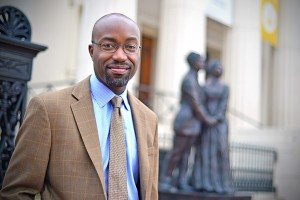It’s been three years since the launch of For the Sake of All, the groundbreaking, multidisciplinary project on the health and well-being of African Americans in St. Louis.
The initiative, led by Jason Purnell, assistant professor at the Brown School at Washington University in St. Louis, continues to gather momentum as it moves into its third phase: implementation of recommended strategies.

The first phase of the project culminated in a comprehensive report released in May 2014. The second phase, which concluded this summer, was spent educating the community and policymakers about issues raised in the report.
Six community action forums were held over the past two years to distribute discussion guides and toolkits on each of the six areas of recommendation.
Those are:
- investing in quality early childhood development;
- creating economic opportunities for low-to-moderate income families;
- investing in coordinated school health;
- investing in mental health awareness, access and surveillance;
- investing in health-promoting neighborhoods; and
- enhance chronic and infectious disease prevention and management.
While there have been many challenges along the way, interest in the project remains high and Purnell is excited about the number of organizations he has been able to partner with. Here, he talks about moving the work forward:
Purnell knows St. Louis is facing a number of challenges as a region. Here, he talks about why this a critical time for this project to be taking place:
In addition to hosting community action forums, Purnell and his team have been partnering with local churches and faith groups. Here, Purnell discusses how faith and morality play into For the Sake of All.
As the project moves into its third phase, Purnell’s aim is to take the work into specific neighborhoods and give residents an opportunity to react to the data, talk about their priorities and determine “how we might use data and research methods to help them actualize some of the priorities that they have for their own communities,” he said.
While he is planning on a two-year third phase, Purnell knows the work will continue far beyond 2018.
“As we think about implementation, the next step is then evaluating and learning from what we implement, and that becomes the new data point we plan and strategize around,” Purnell said.
“It’s a cyclical process of informing, educating the broader public and multiple stakeholders around the issues that matter, trying to coordinate and convene the right people to get things done, and rigorously measuring what happens as a result of that implementation.”
To learn more, visit forthesakeofall.org.